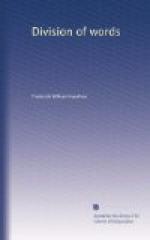In the case of the reformed spellings, however, the departure from the ordinary appearance of the words is so great that the author cannot be allowed full freedom to set aside the office style. If he is paying for the printing he may insist on his spelling. If he is contributing to a periodical and the printing is done at the publisher’s expense it is for the publisher to determine the style of printing to be used.
Any full consideration of the question of reformed spelling is hardly in place in this book. The author may perhaps be permitted one observation. Innovation in the use of the English language would appear to be primarily the work of scholars, and the adoption of such innovations would seem to belong to the book printer rather than to the commercial printer. The public mind as a whole is conservative. It is not hospitable to changes and does not soon become aware of them, much less familiar with them. The commercial printer makes his appeal to the mind of the general public. He will do well to use a vehicle familiar, intelligible, and acceptable to it.
Correct spelling is mainly a matter of habit and observation. To a certain extent it is a matter of careful pronunciation, but this is not always a safe or even a possible guide. The vowels preceding or following the one on which the primary accent falls, sometimes called obscure vowels, are so slurringly pronounced that even a pedantic precision will hardly make it possible to indicate clearly which vowel is used. The writer remembers seeing an examination paper written by a fourth year medical student in which the word fever was spelled fevor. A moment’s thought will show that so far as pronunciation is concerned the word might be spelled fevar, fevir, fevor, fever, or fevur without any appreciable difference. The correct spelling is merely a matter of observation.
The author has on his desk at the moment of writing these lines half a dozen good books, each containing a set of rules for spelling. From these it would be easy to compile a set of fairly good rules. Each of these rules, however, has exceptions, in some cases quite numerous. To remember these rules with their exceptions would be a considerable mental task and to apply them would be cumbrous and time consuming. The effort would probably resolve itself into an actual learning of the words which present difficulties. The best way to become a good speller is to form the habit of careful reading, observing the form of every word as it passes before the eye and so unconsciously fixing it in the memory. The dictionary should be consulted whenever there is any doubt.
If you are to write a word, call up a mental picture of it, and if the picture is not perfectly clear go to the dictionary and fix a correct image of it in your mind. Be careful to pronounce every word you use as correctly as possible and you will get all the aid pronunciation can give you. Careless speaking and careless reading are the two great sources of incorrect spelling.




